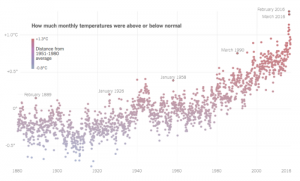Recently, scientists reported that the Earth reached its highest temperature on record in 2016, trouncing a record set only a year earlier, which beat one set in 2014. It is the first time in the modern era of global warming data that temperatures have blown past the previous record three years in a row (below).

In the United States alone there are over 3,500 landfills that emit 20% of dangerous methane gas into the atmosphere. Since 1960, humans have doubled the daily garbage contribution due to our thirst for plastic water bottles. Just last year, Americans used about 50 billion plastic water bottles, with 80% ending up in landfills. This means that 38 billion water bottles or $1 billion worth of recycled materials are wasted every year. Most of the world’s recycling plants cannot afford large industrial spectrometers to sort garbage, and rely on inefficient, expensive, human labor.
While some might doubt climate change, roboticists across the globe are rising to tackle the dullest, dangerous, and possibly the dirtiest job – sorting garbage. In the past year, the waste industry has begun to embrace new software and mechatronic innovations to bring down costs.
A leader in this field is the Finnish company ZenRobotics, which utilizes machine learning, computer vision, and synchronized robotic arms to sort and pick recycled materials from moving conveyor belts. By training its system of recycling stations to use a neural network, the AI autonomously learns the types of materials it needs to quickly pick from real-time data feeds via its connected spectroscopic cameras, 3D laser scanners, and metal sensors. The company released the above movie trailer-like video to introduce its novel approach to the waste management industry.
According to Janica Johansson, ZenRobotics’s Marketing Director, “That means that the robots are able to make autonomous decisions on what to sort out. There is no human involvement in the sorting process, and the robots are not pre-programmed to do anything. One of the benefits of our software [is] that it actually can adapt to the changing waste streams.”

Spanish-based Sadako Technologies is also working on AI-infused garbage sorting systems, just on a smaller scale. Similar to Zen, Sadako uses proprietary algorithms that connect to its…

